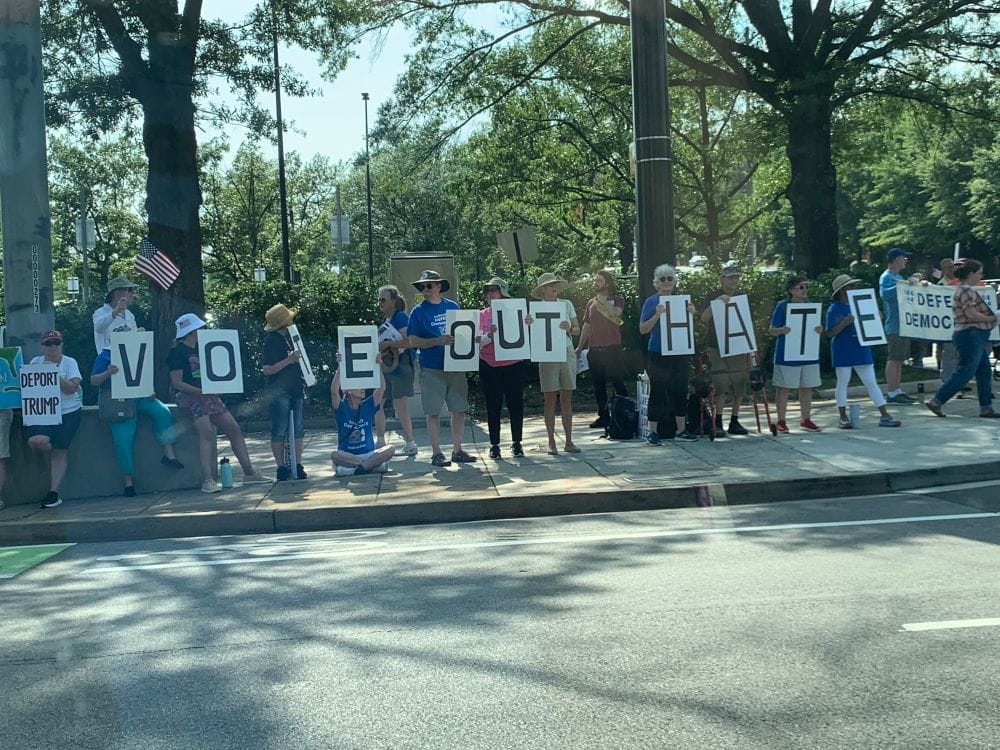- Degenerate Art
- Posts
- July 18 Friday roundup
July 18 Friday roundup
Links to the podcast and some good news for your weekend.
This week’s episode of the podcast considers the ways that concentration camps cross-pollinate and repeat, and how we can work to prevent even worse systems from rising on the foundation being laid by the U.S. today. You can watch the episode on YouTube or listen to it via Apple, Spotify, and anywhere else you get your podcasts. If you want to read it instead of watching or listening, or if you’d like to explore links to people and events mentioned in the episode, you can find them in this week’s Tuesday post.

A Falls Church, Virginia, streetcorner on July 17.
Today will be a short post, but I want to share a few things with you. If you didn’t listen already, I was on WCPT 820’s “The Big Picture” with Edwin Eisendrath a few days ago to talk about concentration camp history. The conversation wasn’t a long one, but we hit on a lot of important things in the time we had.
And if you’re on Bluesky, I did a long thread on Thursday about the news from The Washington Post that detainees in the Everglades camp are swarmed by mosquitoes in the showers there and can’t sleep at night due to being bitten. I traced the arc of more than a century talking about mosquitoes in concentration camps. Whatever you’re thinking, it’s a little bit like that, but is likely to have some angles you’re not thinking of yet. You can check it out here, where someone gathered it into a shareable webpage. (And if you’re not on Bluesky yet, I encourage you to join. Bluesky and Mastodon are the only platforms I’m on where you can choose to see only posts from people you follow in the order they post them. And links are never suppressed.)
In the midst of some grim times, it’s important to realize how many good things are still happening. On the way home from the store Thursday, I was driving by the metro station near my house. I had put in the Tuesday post and this week’s podcast that on July 17 “Good Trouble Lives On” would be holding nationwide events.
I often try to get out on those national days of protest to cover the rallies and talk to people who show up. But in this case, I had appointments and knew it would be too hard to get anywhere on Thursday. I hadn’t even looked to see what was going on near me. Which meant that when I drove by and saw a small crowd at the metro, it wasn’t until I saw the signs that it hit me a neighborhood rally was underway.
And as I drove past the station, I saw there were more people all along the block—and a whole second group at the next stoplight. I turned left and drove up a hill, and people were scattered in little bunches along the sidewalk all the way up the hill to the next stoplight. And when I looked to my left, I saw that on the overpass above I-66, demonstrators had made a huge sign, which was visible to people up top crossing over and to cars down below.
I inadvertently had the experience of being one of the people that demonstrators were out there trying to reach and having the experience they hoped passersby would have. I was surprised and delighted to randomly encounter other humans who also want to repudiate all the cruelty happening right now.
It’s amazing what a joyful thing it was to be reminded of that. And for those of you who go out on the streets to stand against what’s happening in the U.S. right now, it made me want to tell you just what it feels like to people who wind up seeing your signs or your little groups (or your big groups) in the middle of their day.
It also made me think I should share a few of the good things that have happened this week with you. It’s easy to miss them, but they matter just as much as the events that we’re grieving. And they provide some paths for action and some models for ways to respond to what’s happening all around us. So here you go:
“’It’s a Miracle’: Queens High Schooler Detained for Weeks in Louisiana After ICE Courthouse Arrest Reunites with Family,” from The City.
“Army veteran plans to sue over his detention after Camarillo raid, says ‘it shouldn’t have happened,” from KABC-TV in Los Angeles.
“Father of Three Marines Who Was Beaten by ICE Agents Released, Leaving Family To Process His Detention,” from Military.com.
“How ICE’s Arrest of a High School Student Activated a Massachusetts Town,” from Mother Jones.
“Judge says immigration agents must stop ‘roving patrols’ that have upended Southern California,” from Cal Matters.
There’s always more to do, but other people are out there getting things done, too. Together, we can make the country we want to live in.
Your paid subscriptions support my work.
Reply